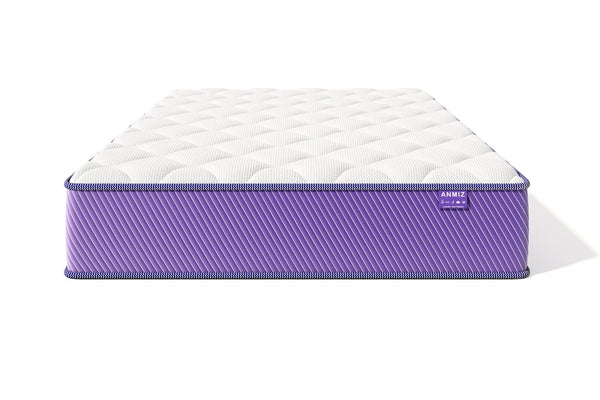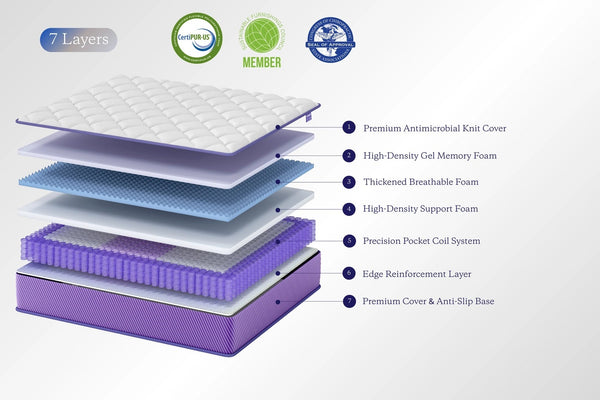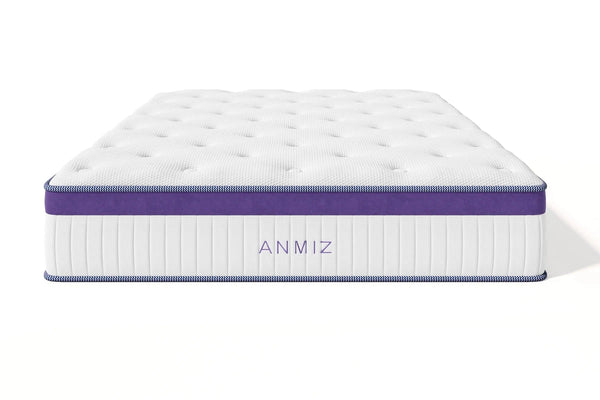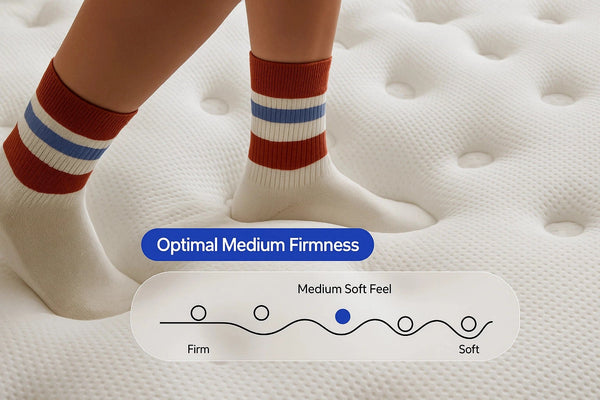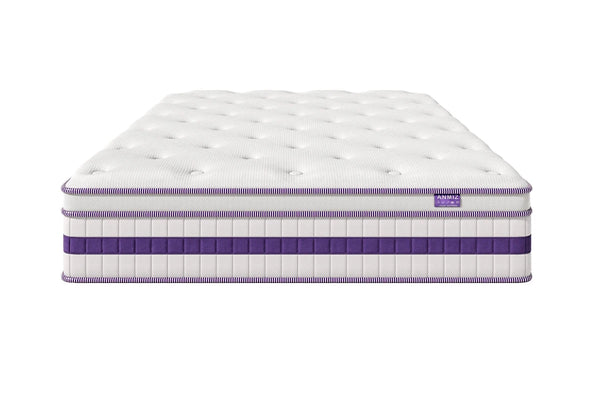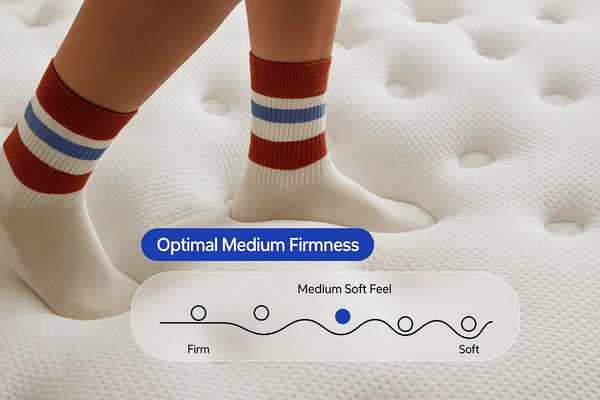Choosing the right mattress for back sleepers is essential for ensuring a comfortable and restorative night's sleep. A **mattress for back sleepers** can significantly reduce pain and improve overall well-being.
Why Is a Mattress for Back Sleepers Important?
Keeping Your Spine Happy and Healthy
Have you ever woken up feeling like you spent the night sleeping on rocks instead of a mattress? If you're a back sleeper, this discomfort is often due to sleeping on the wrong mattress. Sleeping on your back requires a mattress that perfectly supports your spine, helping it maintain its natural, neutral position. Without this, you might experience unwanted strain, leading to stiffness and aches in the morning.
Choosing the right mattress for back sleepers isn't just about comfort—it's about protecting your overall health. Proper spinal alignment reduces muscle strain, improves blood circulation, and ensures a more restful sleep experience, leaving you feeling refreshed every morning.
Why Pressure Relief Matters for Back Sleepers
Back sleepers naturally put pressure on certain body parts, especially the lower back, shoulders, and neck. This concentrated pressure can cause discomfort and eventually chronic pain if your mattress isn’t supportive enough. A mattress designed specifically for back sleepers evenly distributes your body weight, relieving pressure and preventing painful spots.
Imagine sleeping through the night without tossing and turning due to pressure discomfort—sounds dreamy, doesn’t it?
Key Features of the Best Mattress for Back Sleepers
Finding the Right Firmness Level
When you're sleeping on your back, firmness is essential. A mattress that's too soft won't support your spine properly, leading to poor alignment and morning aches. Too firm, and you'll feel like you're lying on a wooden board. Medium-firm mattresses are the perfect balance, providing just enough cushioning to contour gently to your body, while offering the essential support to keep your spine aligned naturally.
So, what's the sweet spot for back sleepers? A medium-firm mattress rated between 5 and 7 on the firmness scale is generally ideal.
Materials That Enhance Comfort and Support
The type of material your mattress is made from significantly impacts comfort and support:
- Memory Foam: Perfectly molds to your body’s shape, providing tailored pressure relief. It’s ideal for those who like a gentle "hug" sensation as they sleep.
- Latex: Offers bounce and breathability, keeping your body cool and providing natural support without sinking too deeply.
- Hybrid: Combines foam layers with innerspring coils for balanced comfort, ideal for those who prefer a bit more bounce and extra support.
Each material has unique advantages, so consider what feels best for your sleeping style and personal preference.
How to Choose the Right Mattress for Back Issues
Understand Your Back’s Specific Needs
Are you dealing with general back stiffness or more serious lower-back issues? Identifying your exact requirements will help you select a mattress that addresses those specific concerns. For instance, chronic lower back pain may benefit most from mattresses with reinforced lumbar support.
Consider consulting a healthcare professional if you have severe back conditions. They can offer valuable guidance tailored to your unique situation.
Test Your Mattress—Sleep Trials Matter
Did you know many mattress brands offer extended sleep trials, often between 30 to 100 nights? This trial period lets you test the mattress in the comfort of your home, assessing whether it provides adequate support and comfort over multiple nights, rather than just a few minutes in a showroom.
This "sleep trial" is an excellent opportunity to determine if your potential mattress truly matches your back sleeping needs—so take advantage of it!
Tips for Combining Comfort and Support
Achieving Neutral Spine Alignment
To ensure optimal sleep quality, your mattress should keep your spine aligned from your neck down to your lower back. Neutral alignment means your body maintains its natural curves without strain or discomfort.
How do you know your mattress is doing its job? You’ll wake up without stiffness, aches, or the urge to stretch immediately upon rising.
Quality Pillows Complete the Sleep Equation
Even the best mattress can’t do its job alone—a supportive pillow is essential, particularly for back sleepers. Your pillow should cradle your head and neck without pushing your chin toward your chest or tilting your head back.
Consider memory foam or contoured pillows designed specifically for back sleepers. Pairing the right mattress with a quality pillow creates the ultimate sleep setup for restful nights.
Common Mistakes to Avoid
Thinking All Mattresses Are Created Equal
One of the most common misconceptions is that any comfortable mattress is suitable for back sleepers. However, a mattress perfect for side sleepers might not provide the right spinal support for back sleepers. Avoid this mistake by selecting mattresses specifically designed with back sleepers in mind.
Overlooking Mattress Durability
Another frequent error is not considering mattress durability. Investing in a durable, high-quality mattress ensures consistent comfort and support over many years, saving you money and back pain down the line.
Tip: Look for mattresses with extended warranties or high customer satisfaction ratings for durability.
Comparison Table: Mattress Types for Back Sleepers
| Mattress Type | Firmness | Pressure Relief | Spinal Alignment | Durability |
|---|---|---|---|---|
| Memory Foam | Medium-Firm | Excellent | Very Good | Good (8-10 years) |
| Latex | Medium-Firm | Good | Excellent | Very Good (10-12 years) |
| Hybrid | Medium-Firm | Very Good | Very Good | Good (7-9 years) |
FAQs: Common Questions About Mattresses for Back Sleepers
What Makes a Mattress Ideal for Back Sleepers?
An ideal mattress for back sleepers maintains neutral spinal alignment, evenly distributes weight to relieve pressure points, and offers a medium-firm level of support.
Can Side Sleepers Comfortably Use a Mattress for Back Sleepers?
While some mattresses cater to both back and side sleepers, side sleepers usually prefer softer mattresses to cushion their shoulders and hips. Always check mattress specifications to ensure suitability for your preferred sleeping position.
When Should You Replace Your Mattress?
Typically, a quality mattress lasts between 7 to 10 years. However, replace your mattress sooner if it loses support, shows visible sagging, or no longer provides a comfortable sleeping experience.
A Little Mattress Humor to Sleep On
Why did the mattress go to therapy? Because it had too many springs attached! Remember, choosing the right mattress doesn’t have to be stressful. Take your time, test options, and prioritize comfort—you deserve it!

